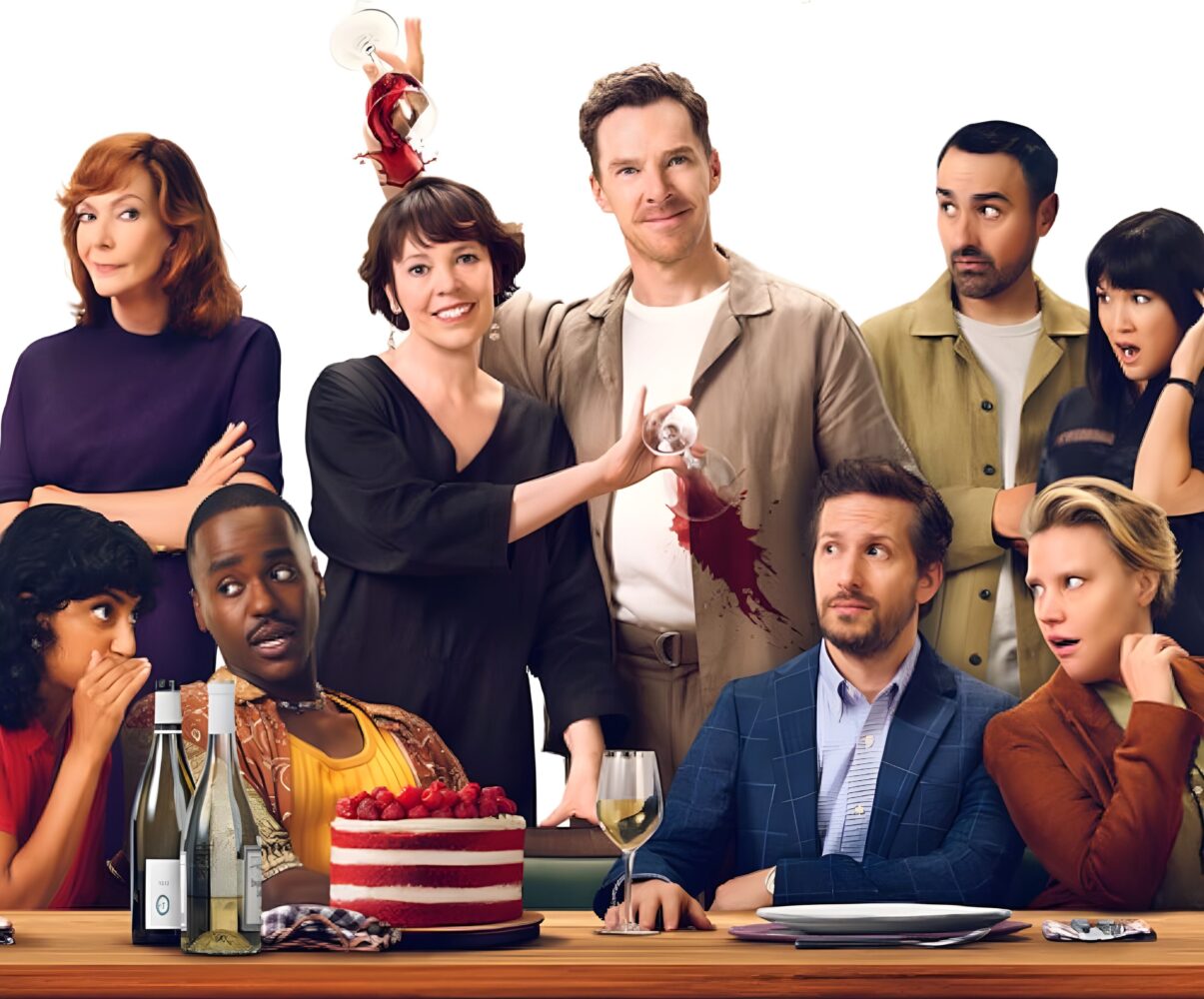TL;DR: Two incredible performances keep The Roses from wilting, but the film plays it too polite. Watch it for Colman and Cumberbatch’s duel, not for the bite that the story promises but never delivers.
The Roses
When Comedy Meets Carnage: The Setup
There’s something irresistibly voyeuristic about watching two brilliant actors verbally (and sometimes literally) rip each other apart. I’ve always found it comforting in a twisted way—like listening to someone else argue at a dinner party and realizing, hey, at least my relationship isn’t that bad. That’s what made me so hyped for Jay Roach’s The Roses, a new spin on Warren Adler’s The War of the Roses. With Benedict Cumberbatch and Olivia Colman headlining? My expectations were sky-high. This could’ve been the perfect black comedy cocktail: a splash of venom, a twist of chaos, and two masterful performances to tie it together. And yet… The Roses keeps pulling its punches. Instead of plunging into glorious nastiness, it circles the edge with a smirk, too polite to really draw blood.
Therapy and the Narrative Own-Goal
The movie kicks off with Theo (Cumberbatch) and Ivy (Colman) in counseling, tasked with listing ten things they love about each other. Naturally, the sweet exercise curdles into sarcastic digs, passive-aggressive quips, and the sort of verbal sparring British actors were genetically engineered to deliver. They laugh it off, leave, and the film promptly undercuts itself with a voiceover: we learn they’re still reflecting on this moment years later. The dramatic tension—the looming question of “will they obliterate each other or somehow reconcile?”—is spoiled in the opening minutes. It’s like someone telling you how the murder mystery ends before you’ve even met the detective.
Ivy, Theo, and the Shifting Tectonic Plates of Marriage
The backstory is familiar but fertile ground. Theo is a stubborn architect, clinging to artistic purity while the world shrugs. Ivy is a chef with big ideas but middling results—until her gloriously tacky seafood joint, “We’ve Got Crabs,” inexplicably becomes a hit. Suddenly, Ivy is thriving, Theo is sidelined, and the power dynamic in their marriage inverts overnight. That’s where resentment germinates, festering beneath the surface. This is the meat of The Roses: two people who love each other but can’t stomach each other’s success. It’s raw, it’s relatable, and in the hands of Colman and Cumberbatch, it’s electric.
And honestly? Watching them is worth the price of admission. Colman’s ability to pivot from silly to soul-crushing is unmatched. She’ll be cracking a goofy line about crabs one second, then drop a gut-punch of bitterness the next. Cumberbatch, meanwhile, plays Theo as both admirable and insufferable—the kind of guy who proclaims “the work goes on” while simmering with disappointment that nobody recognizes his genius. Together, they’re volatile, magnetic, and at times almost frightening.
A Wasted Supporting Cast
Here’s where the wheels wobble: everyone else. Allison Janney gets one killer scene before evaporating from the film. Andy Samberg and Kate McKinnon show up as a fellow married couple with their own dysfunctions, but they’re stuck in comic-relief purgatory, never allowed to be as sharp or layered as Theo and Ivy. Zoë Chao, Jamie Demetriou, Sunita Mani, Ncuti Gatwa—talented performers, all of them—but they’re given scraps. They orbit the Roses’ implosion without ever leaving a dent. In a film about relational dominoes, it’s frustrating that so many characters are treated like background noise.
Jay Roach Plays It Too Safe
Jay Roach has always had a knack for familial tension—Meet the Parents remains a masterclass in dinner-table discomfort. And here, he tries to channel some of that same energy. But instead of leaning into the grotesque escalation that made Danny DeVito’s 1989 adaptation so gleefully twisted, Roach reins things in. Every time the story edges toward genuine darkness, he nudges it back into safer, snarkier territory. You get laughs, yes, but never the cathartic release of full-blown chaos. It’s comedy that refuses to bite, when biting is exactly what the story needs.
McNamara, Declawed
This part stings the most: Tony McNamara wrote the script. Yes, the same McNamara who gave us The Favourite, The Great, and Poor Things. The man has a PhD in acidic banter and grotesque humor. And yet here, his pen feels dulled. The dialogue is clever, sure, but it’s overwritten and self-conscious, occasionally acknowledging its own cleverness as if that makes up for the lack of sting. It’s as if McNamara’s trademark viciousness was trimmed away in the editing room, leaving us with a script that’s playful when it should be venomous.
The Ghost of 1989
Comparisons to DeVito’s The War of the Roses are inevitable—and damning. That film was fearless, leaning hard into marital collapse until it bordered on gothic horror. It didn’t care if the audience squirmed; it wanted you to. The Roses, by contrast, is polished, charming, and sanitized for wider appeal. It’s the cinematic equivalent of a wine glass fight that ends with everyone chuckling and tidying up the shards. Fine, but not unforgettable. Watching this version, you can’t help but wonder if the genre itself has lost its nerve. Would a studio even bankroll something as unapologetically bleak as DeVito’s film today? Probably not—and that’s the tragedy.
The Performances Save It… Barely
At the end of the day, Colman and Cumberbatch keep the whole thing from collapsing. They spar with such precision and delight that you almost forget how neutered the rest of the movie feels. You can see the embers of a once-burning love in their performances, even as they plot each other’s emotional downfall. Their chemistry is the thorn in this otherwise over-pruned rose bush.
Final Thoughts
The Roses isn’t bad—it’s just safe. Too safe for a story that begs for carnage. It entertains, it charms, and thanks to its leads, it sometimes even dazzles. But it never terrifies, never unsettles, never commits to the true blackness at its core. This should’ve been a dagger disguised as a comedy; instead, it’s a butter knife with some witty engraving.






